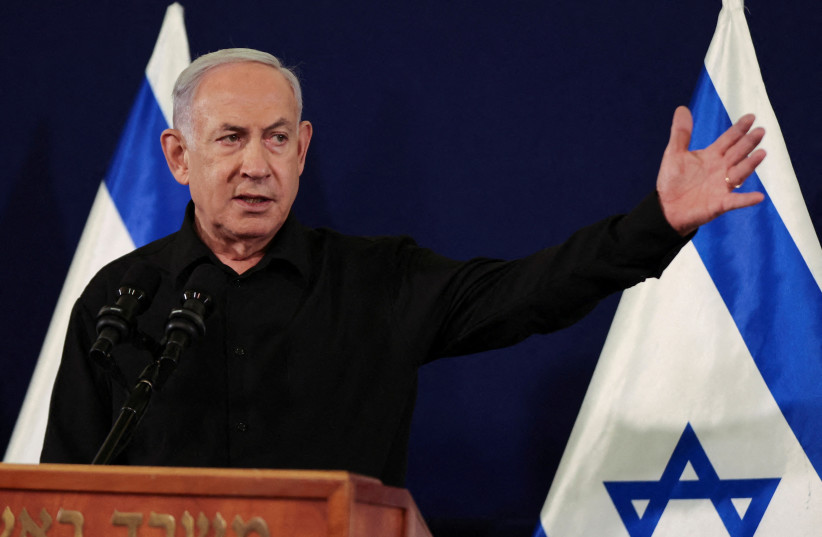If you listened to the ear-shattering noise in the streets and squares of Israel coming from the protesters opposing judicial reform earlier this year, the message that Prime Minister Benjamin Netanyahu was really bad for Israel came through loud and clear. If you followed the press pronouncements from the Ramallah headquarters of the Palestinian National Authority, Netanyahu was really bad news. If you read the Oct. 4 New York Times column of Tom Friedman, you’d learn that “the biggest threat to [Israel’s] Jewish democracy today is an enemy within, a judicial coup led by Netanyahu that is splintering Israel’s society and military.”
So, how bad or how good is Benjamin Netanyahu?
For more stories from The Media Line go to themedialine.org
The first problem is that to answer that question, one must wade through much media maligning. One need only recall that Netanyahu is facing trial for allegedly bribing the owners of the Yedioth Ahronoth and Walla news companies. If the media wasn’t against him previously (they were), his coverage at present is misrepresented, skewed, and uncharitable. If there’s anything he does or says that can be presented in a negative light, then that will come to pass.
In The Jerusalem Post, Seth Frantzman quotes Ahmed Bin Sulayem, the executive chairman and CEO of the Dubai Multi Commodities Centre, saying, “The Abraham Accords marked a turning point in our region’s history, setting the stage for transformative opportunities across sectors.” Those agreements are downplayed in the press, as is their follow-up, the nascent Saudi Arabia peace process.
Netanyahu’s force of personality and persuasion can succeed in this venture, yet the country’s left is now, paradoxically, anti-peace, if only because Netanyahu is pushing it. Even Haaretz’s Nehemiah Strassler must admit that “Netanyahu could triumphantly brandish three major gifts he had received: the start of a normalization process with Saudi Arabia, the visa waiver for Israelis traveling to the United States, and the promise of a full meeting at the White House toward the end of the year,” yet pundits continue to insist on finding fault.

He is cut no slack at all.
Netanyahu has the most experience, the most diplomatic charisma, and savvy, and commands the attention of the world, its politicians, and even its media. No other Israeli politician comes close, no matter how they think of themselves. These qualities are a necessity in today’s reality. The Iran situation is a prime example of Netanyahu’s ability to challenge even the United States and overcome the opposition to hold a firm assertive anti-Iran policy, one that President Joe Biden and European leaders would prefer.
A second criticism is his more than awkward situation of being charged with several supposed crimes, and the moral ramifications commensurate with his high office. However, as the trials proceed (one out of the four has been canceled), it becomes more obvious that it is quite possible that people within the Justice Ministry and the Attorney General’s and State Prosecutor’s Offices will be suspected of legal manipulations.
Netanyahu is not stained.
Much anger is directed at Netanyahu’s obvious ignoring, as much as possible, any diplomacy centered on negotiations with the Palestinian Authority. Taking into consideration PA President Mahmoud Abbas’ growing overt antisemitism over the past two years, his unyielding support for the “pay-for-slay” terrorist stipends, his undemocratic rule and the harm to the human rights of his own population, Netanyahu’s stance is quite logical.
Netanyahu, admittedly, heads a coalition that presumably is not to his own liking. But Yair Lapid and Benny Gantz left him no choice in refusing to join him when they had the chance. The anti-judicial reform protest was, indeed, damaging to Israel, with Netanyahu targeted as being a “dictator” and even portrayed as a Nazi. But that is an internal problem that really does not affect those outside the camp of the progressive liberals.
Israel is not being ostracized under his premiership, at least not economically. We have just read that Rafael, a government defense company, made a deal to put its Trophy system on the UK’s Challenger 3 tanks, and that Germany has signed a deal to purchase, to the tune of $3.5 billion, the Arrow missile shield system.
The opposition to Netanyahu is harsh and rather nasty. On the evening of Oct. 3, Professor Asa Kasher spoke to a group of protesters outside MK Yuli Edelstein’s home and declared, “We are at a time of war, and we do not search for unity with the enemy, for at this time of war we struggle against him, without compromise.”
This approach, of course, has sharpened following the events of the Hamas attack on Oct. 7.
However, it is quite obvious that Netanyahu was quite disconnected from the military failures, which were by the intelligence branch, as well as the army’s almost total breakdown for the first four to six hours. As for the so-called “concept,” that Hamas could be bought off: that thinking was shared not only by the top professional echelons including the GSS and the Mossad, but also by the previous two prime ministers and the defense ministers going back half a dozen years.
In any case, the current military campaign of Operation Iron Swords appears to be going successfully. If that continues, one can only credit Netanyahu for managing it in such a fashion.
Netanyahu is a strong leader with a determined personality. And that is yet another reason he is the correct person to fill the job of leading Israel at this time.
Yisrael Medad is a research fellow at the Menachem Begin Heritage Center.
